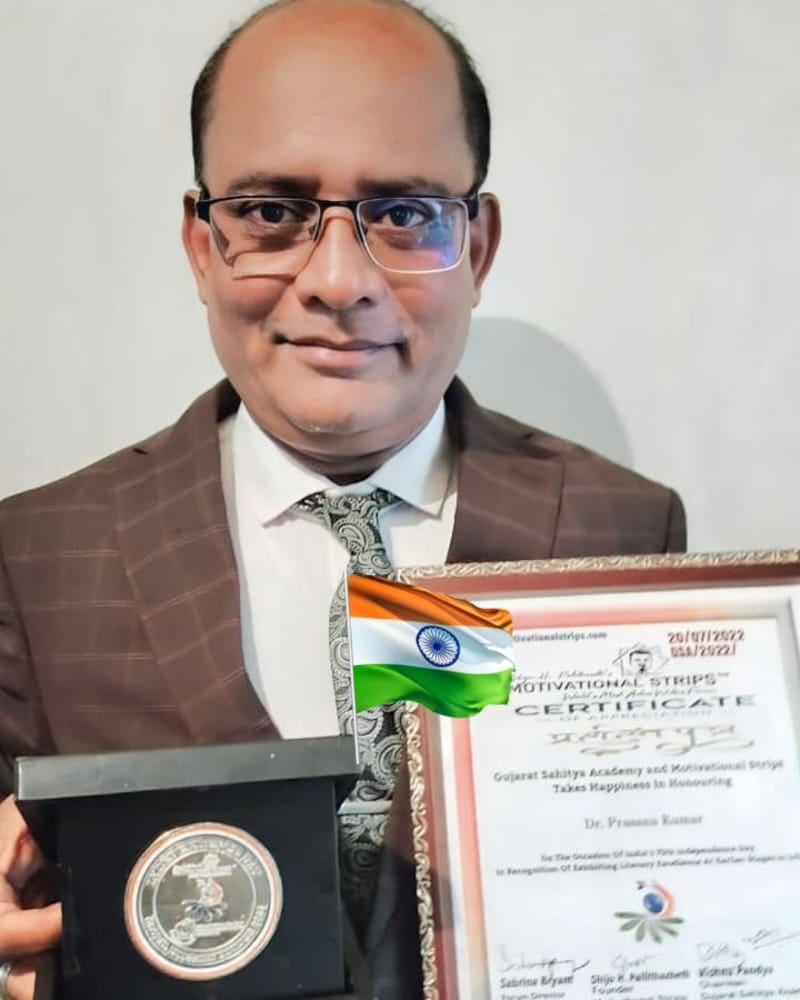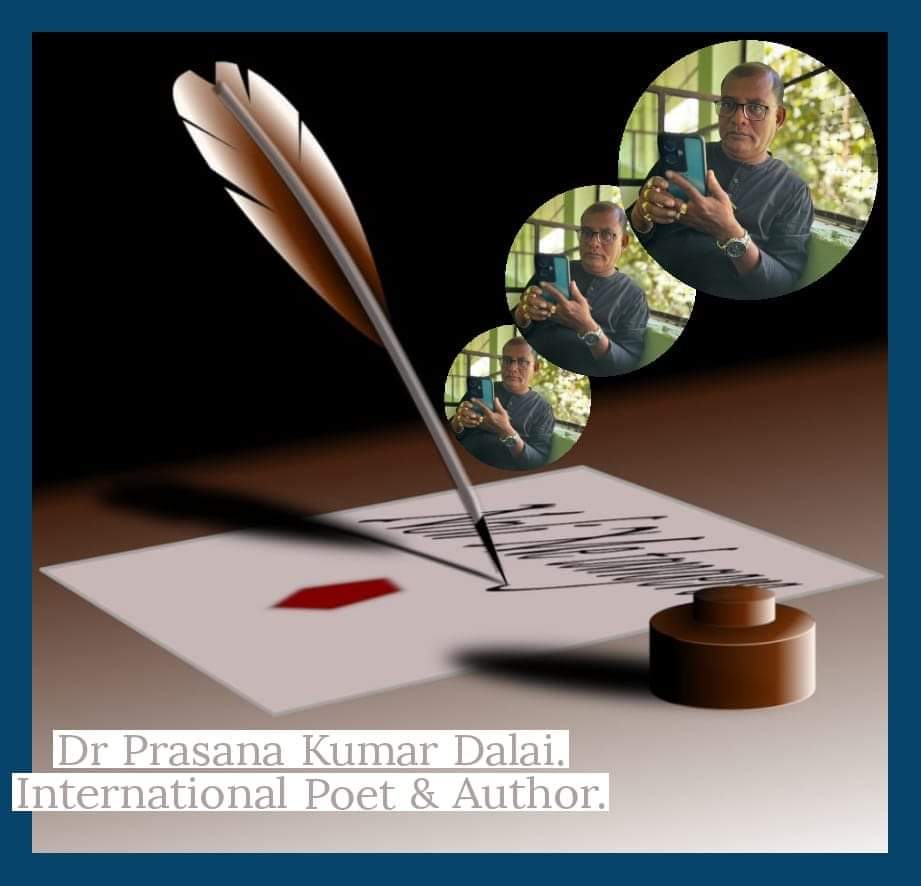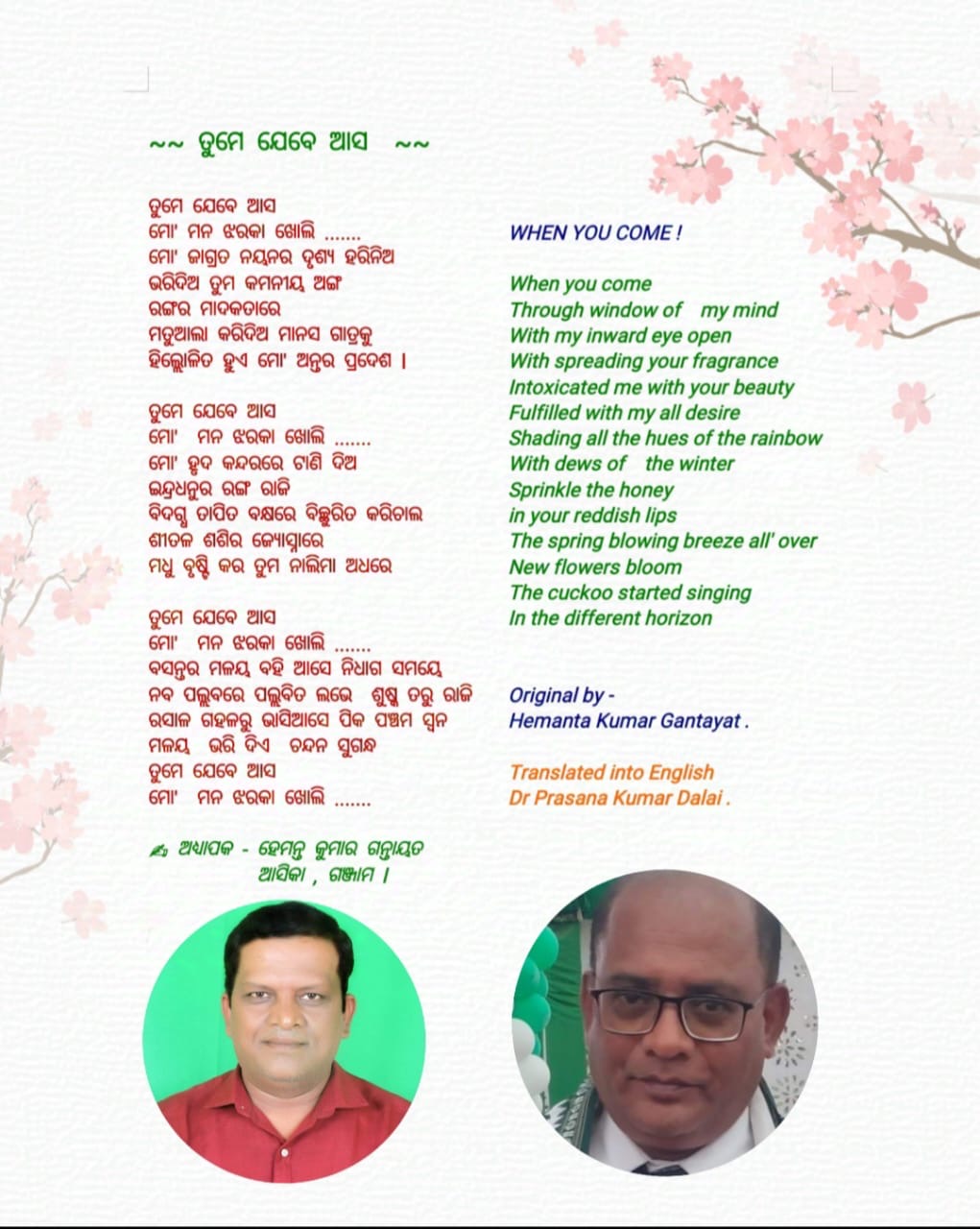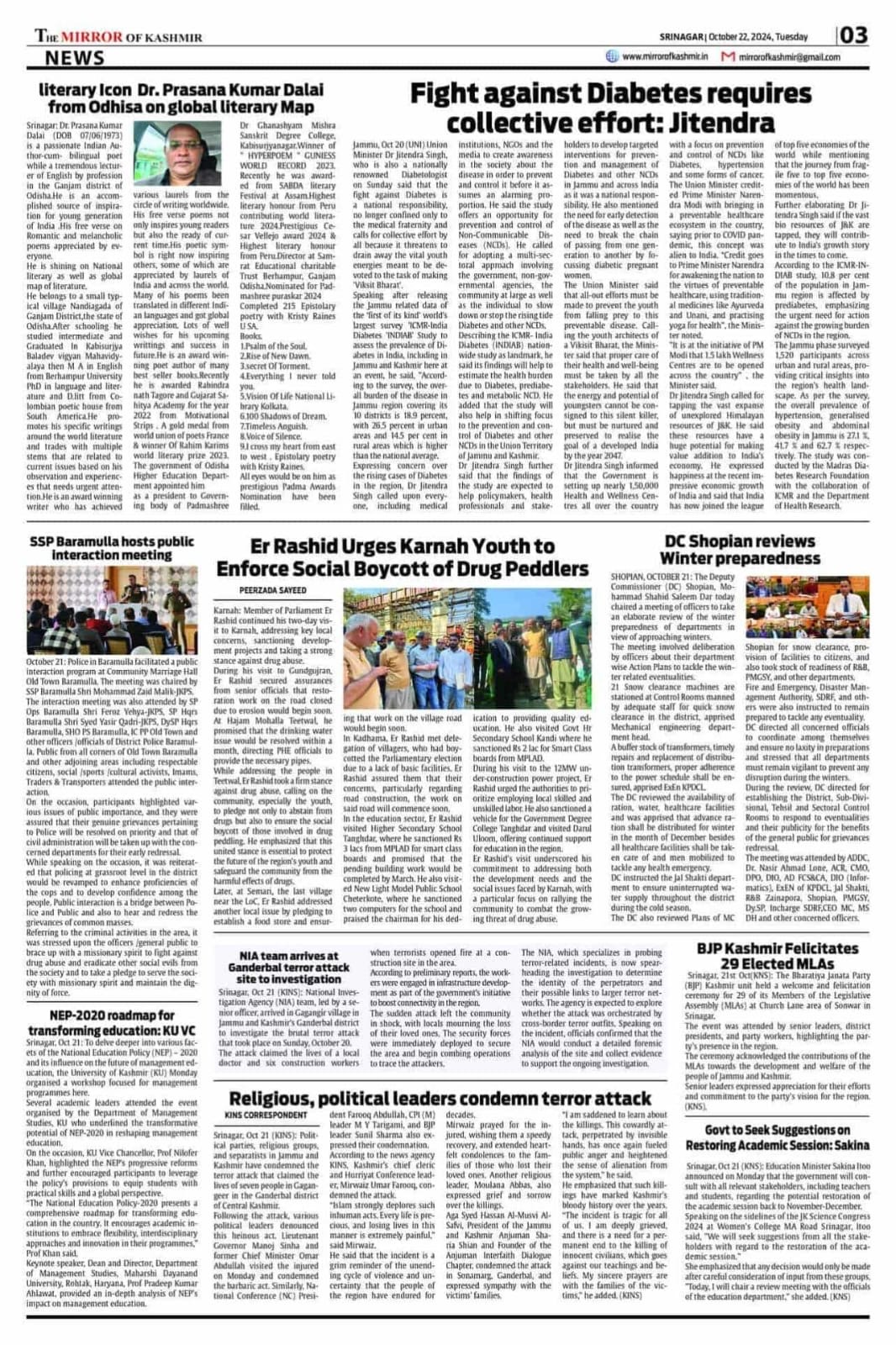
ଯେବେ ସବୁ ଆଶା ମଉଳିଯାଏ!
ଆମ ଶରୀର ଶୁଷ୍କ ଓ ନିର୍ଜୀବ
ଦୁଃଖର ଚାଦର ରେ ଢାଙ୍କି ହୋଇଥିବା ଦୁହିଁଙ୍କ ଆତ୍ମା
ଦୁଃଖରେ ବି ଖୋଜିଛି ତୁମକୁ
ପ୍ରତ୍ୟେକ ଟି ଇଛା ଆଜି ସ୍ତମ୍ବିଭୂତ
ଚାରିଆଡେ ଖାଲି ମରୁଭୂମି
ତୁମର ଉଦ୍ୟେଶ ଦସ୍ୟୁ ପରି ଲୁଟୁଛି
ମୋ ଜୀବନ ଠୁ ଦୁରେଇ
ନା ତୁମେ ଖୁସିରେ ବଞ୍ଚିଛ
ନା ମତେ ମରିବାକୁ ଦେଇଛ
ସବୁ ଅଭିଳାଷ ମୋ ଦିନପରି ସରିଯାଏ
ତଥାପି ବଂଚିବି ଶେଷ ନିଶ୍ୱାସ ପର୍ଯ୍ୟନ୍ତ
କିଛିତ ରହିନି ସେଠାରେ
ଯେଉଁଠି କେବଳ ଦୁର୍ବିସହ ଦୁଃଖ
©️®️ଡ଼କ୍ଟର ପ୍ରସନ୍ନ କୁମାର ଦଳାଇ
କବିସୂର୍ଯ୍ୟନଗର
ଗଞ୍ଜାମ

LET ME HOLD !
You will come and meet me somewhere
Give me dreams by asking questions
Otherwise I keep doing useless things
I do always have to pass by your side
Tell me that you will remain the same
I am waiting all time chanting your name
I find my peace, pain and love in you
Let me hold it so tight lest it should slip
Time is flying by and we’re so helpless
You’re my passion I always cherish high.
©️®️Dr Prasana Kumar Dalai@India
Date 10 Sunday November 2024

Epistolary poem #225 Presented by Dr. Prasana Kumar Dalai of India
and Kristy Raines of The United States of America
THE TALK OF THE TOWN !
My morning has already come smiling
New dreams even with eyes wide open
An indication that happiness is lurking
Radiant morning and uplifting breeze
Being drenched, she runs into my arms
An angel with lovely tune of her anklets
The talk of the town is soft and smooth
Though old, fresh seem conversations
Beyond all thoughts this life moves on
I am a bud blooming at your first sight
Find myself dissolved in thy love genuine
And I would love to find my muse in you.
©️®️ Dr Prasana Kumar Dalai @India
Date Friday 08 November 2024
Our love never changes….
DRENCHED IN THE MOMENT!
He smiles as I run to his open arms
Like a dream, everything is going in slow motion
The morning is bright and the breeze cool
The only sound is the jingling of my anklets
and I am drenched in this moment of bliss
as My Love pulls me closer to him
I feel his warm and tender embrace
Though we have lived many years together
our conversations together are new everyday
Life with you is always an adventure
and the talk of the town we may be
But I love you more today than when we met
The way you look at me is with hunger
And I would love you to be your inspiration forever…
©️®️KristyRaines@USA — with Kristy Raines.

My poem THE TALK OF THE TOWN reviewed by eminent reviewer retired Prof Dr Nirakar Dash of Department of English Assam Government.
Humbled & Honoured.
THE TALK OF THE TOWN !
My morning has already come smiling
New dreams even with eyes wide open
An indication that happiness is lurking
Radiant morning and uplifting breeze
Being drenched, she runs into my arms
An angel with lovely tune of her anklets
The talk of the town is soft and smooth
Though old, fresh seem conversations
Beyond all thoughts this life moves on
I am a bud blooming at your first sight
Find myself dissolved in thy love genuine
And I would love to find my muse in you.
©️®️ Dr Prasana Kumar Dalai @India
Date Thursday 07 November 2024.
REVIEW
********
Now a days the poet is in a jocund mood suggested by the figurative “smiling morning”.He is looking forward to his sunny days with his beloved.The joy of the unexpected hug she gave him is expressed through:”Radiant morning and uplifting breeze”. Painting her as an angel with jingling “anklets” lends an air of supernaturality to her.Previously the people around them were somewhat critical and unfriendly towards them — he and his love.But with time, they, the “town”here in poet’s language,are “soft and smooth “, indicating neither enmity from other suitors nor any social opposition.”Though old,fresh seem conversation”– is a prominent line because it means,to put in Shakespeare’s words, love,”Looks with the mind,not with the eyes”The poet’s life moves on unhindered even with all struggles.His feeling of love, metaphorically expressed in the tenth line,is a love at first sight.As it is genuine,it would Kindle hopes and inspirations in the the poet to write more love poems like this.The word “dissolved” ,being a chemical one, stand for a complete disappearance of the physical ego of the poet and a unworldly unification with his love.The poem is outstanding in nature,Dr Prasanna Sir.Congratulations and my regards.
Prof Dr Nirakar Dash@ India

My poem THE TALK OF THE TOWN reviewed by eminent reviewer Raj Kishor Pattnaik.
Humbled & Honoured.
THE TALK OF THE TOWN !
My morning has already come smiling
New dreams even with eyes wide open
An indication that happiness is lurking
Radiant morning and uplifting breeze
Being drenched, she runs into my arms
An angel with lovely tune of her anklets
The talk of the town is soft and smooth
Though old, fresh seem conversations
Beyond all thoughts this life moves on
I am a bud blooming at your first sight
Find myself dissolved in thy love genuine
And I would love to find my muse in you.
©️®️ Dr Prasana Kumar Dalai @India
Date. 06 Wednesday November 2024
REVIEW *
********
Congratulations to Dr. Prasana Kumar Dalai Sir on his latest poetic creation, The Talk of the Town! This beautiful work radiates warmth, capturing a moment of deep connection and the joy that blossoms from love. The poem opens with a sense of hope as morning arrives with a smile, evoking optimism and readiness for new dreams. Dr. Dalai’s use of sensory imagery, particularly through the “radiant morning” and “uplifting breeze,” creates an atmosphere filled with vibrancy and anticipation, bringing the reader into a moment of refreshing renewal.
One of the most enchanting elements of this poem is the depiction of a beloved figure who “runs into [his] arms” with “the lovely tune of her anklets.” Here, Dr. Dalai masterfully evokes the image of an angelic presence, suggesting that the lover brings a divine, almost celestial joy. His phrasing, such as “the talk of the town,” hints at how their love is cherished and admired by those around them, making it a shared celebration within the community.
Dr. Dalai’s words “I am a bud blooming at your first sight” beautifully portray the transformative power of love, akin to a flower awakening. His imagery of “finding [his] muse” in the beloved adds a personal touch, illustrating how this connection fuels his creativity. The concluding line, “I would love to find my muse in you,” reinforces the poet’s yearning to experience life’s beauty through his partner’s presence, presenting love as both a foundation and a source of inspiration.
Once again, heartfelt congratulations to Dr. Prasana Kumar Dalai for crafting such a tender and profound piece that resonates with universal emotions and leaves a lasting impression on its readers.
Reviewed by
Raj Kishor Patnaik @India

Biography of the Author.
DrPrasana Kumar Dalai
(DOB 07/06/1973) is a passionate Indian Author-cum- bilingual poet while a tremendous lecturer of English by profession in the Ganjam district of Odisha.He is an accomplished source of inspiration for young generation of India .His free verse on Romantic and melancholic poems appreciated by everyone. He belongs to a small typical village Nandiagada of Ganjam District,the state of Odisha.After schooling he studied intermediate and Graduated In Kabisurjya Baladev vigyan Mahavidyalaya then M A in English from Berhampur University PhD in language and literature and D.litt from Colombian poetic house from South America.He promotes his specific writings around the world literature and trades with multiple stems that are related to current issues based on his observation and experiences that needs urgent attention.He is an award winning writer who has achieved various laurels from the circle of writing worldwide.His free verse poems not only inspires young readers but also the ready of current time.His poetic symbol is right now inspiring others, some of which are appreciated by laurels of India and across the world. Many of his poems been translated in different Indian languages and got global appreciation. Lots of well wishes for his upcoming writtings and success in future.He is an award winning poet author of many best seller books.Recently he is awarded Rabindra nath Tagore and Gujarat Sahitya Academy for the year 2022 from Motivational Strips . A gold medal from world union of poets France & winner Of Rahim Karims world literary prize 2023.The government of Odisha Higher Education Department appointed him
as a president to Governing body of Padmashree Dr Ghanashyam Mishra Sanskrit Degree College, Kabisurjyanagar.Winner of ” HYPERPOEM ” GUNIESS WORLD RECORD 2023.Recently he was awarded from SABDA literary Festival at Assam.Highest literary honour from Peru contributing world literature 2024.Prestigious Cesar Vellejo award 2024 & Highest literary honour from Peru.Director at Samrat Educational charitable Trust Berhampur, Ganjam Odisha.
Vicedomini of world union of poets Italy.
Completed 225 Epistolary poetry with Kristy Raines U SA.
Books.
1.Psalm of the Soul.
2.Rise of New Dawn.
3.secret Of Torment.
4.Everything I never told you.
5.Vision Of Life National Library Kolkata.
6.100 Shadows of Dream.
7.Timeless Anguish.
8.Voice of Silence.
9.I cross my heart from east to west . Epistolary poetry with Kristy Raines

My odia poem Bishada ra Kalima translated by eminent reviewer and translator Raj Kishor Pattnaik
Humbled & Honoured.
ବିଷାଦ ର କାଳିମା!
ତୁମ ସ୍ବପ୍ନ ଠାରୁ ମତେ ଦୁରେଇ
ମୂଁ ଜାଣେନି ଭଗବାନ ଠିକଣା
ମୂଁ ମୋ ନିଜରେ ନିଜକୁ ଖୋଜେ
ମୋ ଆତ୍ମା ବି ମୋ ଠୁ ବହୁ ଦୂରରେ
ଆଜି ମୁଁ ପଥ ଭ୍ରଷ୍ଟ ପଥିକ
ହୃଦୟ ଆଊ ହୃଦୟର ସ୍ପନ୍ଦନ ବିଛିର୍ନ
ନିଶ୍ୱାସ ତ ଚାଲିଛି କିନ୍ତୁ ଭାଗ୍ୟ ଏବେ ବାଲିଘର ପରି
ନୂଆ କାହାଣୀ ଲେଖିବା ପାଇଁ ସ୍ୟାହି ବି ଅଭିମାନ କରୁଛି
ବୋଧେ ବିଧିର ବିଧାନ
ଭଗବାନଙ୍କ ନିଷ୍ପତ୍ତି କୁ ମୁଁ ସାମ୍ନା କରି ପାରୁନି!
©️®️ଡ଼କ୍ଟର ପ୍ରସନ୍ନ କୁମାର ଦଳାଇ
କବିସୂର୍ଯ୍ୟନଗର
ଗଞ୍ଜାମ
Translated by Raj Kishore Patnnaik
The Darkness of Despair
Drifting away from dreams of you,
I wander, lost, without a divine guide,
Seeking myself within the depths of my own being,
Yet my soul feels distant, severed from my essence.
Today, I am a traveler astray,
Where heart and its rhythm lie broken, divided.
Though breath sustains, fate crumbles like sandcastles,
Even ink hesitates, unwilling to pen new tales.
Perhaps this is destiny’s decree,
A judgment from God I struggle to face.
— Dr. Prasanna Kumar Dalai
Kabisuryanagar, Ganjam

ବିଷାଦ ର କାଳିମା!
ତୁମ ସ୍ବପ୍ନ ଠାରୁ ମତେ ଦୁରେଇ
ମୂଁ ଜାଣେନି ଭଗବାନ ଠିକଣା
ମୂଁ ମୋ ନିଜରେ ନିଜକୁ ଖୋଜେ
ମୋ ଆତ୍ମା ବି ମୋ ଠୁ ବହୁ ଦୂରରେ
ଆଜି ମୁଁ ପଥ ଭ୍ରଷ୍ଟ ପଥିକ
ହୃଦୟ ଆଊ ହୃଦୟର ସ୍ପନ୍ଦନ ବିଛିର୍ନ
ନିଶ୍ୱାସ ତ ଚାଲିଛି କିନ୍ତୁ ଭାଗ୍ୟ ଏବେ ବାଲିଘର ପରି
ନୂଆ କାହାଣୀ ଲେଖିବା ପାଇଁ ସ୍ୱାହି ବି ଅଭିମାନ କରୁଛି
ବୋଧେ ବିଧିର ବିଧାନ
ଭଗବାନଙ୍କ ନିଷ୍ପତ୍ତି କୁ ମୁଁ ସାମ୍ନା କରି ପାରୁନି!
©️®️ଡ଼କ୍ଟର ପ୍ରସନ୍ନ କୁମାର ଦଳାଇ
କବିସୂର୍ଯ୍ୟନଗର
ଗଞ୍ଜାମ

THE TALK OF THE TOWN !
My morning has already come smiling
New dreams even with eyes wide open
An indication that happiness is lurking
Radiant morning and uplifting breeze
Being drenched, she runs into my arms
An angel with lovely tune of her anklets
The talk of the town is soft and smooth
Though old, fresh seem conversations
Beyond all thoughts this life moves on
I am a bud blooming at your first sight
Find myself dissolved in thy love genuine
And I would love to find my muse in you.
©️®️ Dr Prasana Kumar Dalai @India
Date. Sunday 03 November 2024

Epistolary Poem #224 Presented by Dr. Prasana Kumar Dalai and
Kristy Raines of The United States of America
MARK OF BLEMISH !
We will flow in the air, cloud and rain
As you’re my rain and I’m your cloud
If I’m not yours, I won’t be anyone else’s
Know not why the world is jealous of us
It’s not mark of blemish but kohl of love
An illness in accordance to this world
But the ones in love know it as divinity
The twist of love and life has brought us
I’m deep darkness and you’re my dawn
A lost traveller, I’m yours and you’re mine
It may be infatuation if love is one-sided
But ours is love for each other, isn’t it ?
©️®️Dr Prasana Kumar Dalai @ India
Date 31 October 2024
She never doubts his love…
UNBLEMISHED LOVE!
You are the cloud that holds me like the rain
Together we float through life together
There will never be anyone else in my arms
for it is only your embrace that fits in mine
I fear not by what some see in me as blemished
For those in love see only the divinity
of my kohled eyes as I look into yours
The twists and turns of our lives together
have stood the test of time and still remains
You will always be my light in the darkness
and the heat that warms me on a sunny day
Yes… The line of infatuation was crossed long ago
Leaving only a line of love between you and I…
©️®️KristyRaines@USA — with Kristy Raines.

My odia poem Mo Sasha chithi translated into English by eminent reviewer & translator Raj Kishor Pattnaik
Humbled & Honoured.
ମୋ ଶେଷ ଚିଠି!
କେତେ ଅସଜଡ଼ା ଶବ୍ଦ ତୁମ ହୃଦୟ ରେ
ଆଊ ଯେବେ ତୁମେ ମୋ ଶେଷ ଚିଠି କୁ ଚିରିଥିଲ
ଆଊ ତୁମ ବହିରୁ ଗୋଲାପ ର ପାଖୁଡା କୁ ଫୋପାଡ଼ି ଥିଲ
ମତେ ହରେଇବାର ଭୟ ରେ କାନ୍ଦିବା
ଦୁହିଁକ ଦୁନିଆ ପୁରା ଅସଜଡ଼ା ଆଜି
ତୁମେ ପୁରା ମନେଅଛି ଯେଉଁ ଦିନ ମୋ ହୃଦୟ ଚୋରି କରିଥିଲ
ମୋ ଠୁ ଚୋରି କରିଥିବା ବସ୍ତୁ ରେ ଉପାସନା କରିବା
ମୋର ଶୁଭମନାସି ଭଗବାନ ଙ୍କୁ କହିବା
ମୁଁ ଜାଣେ ତୁମେ ଡ଼ରୁଛ କାଳେ ମତେ ହରେଇଦେବ ବୋଲି
କେତେକ ଶବ୍ଦ ଗୁଡାକ ର ଗୁଂଜରଣ ରେ ଦୁହିଁଙ୍କ ଜୀବନ ଅଲଗା ମୋଡ ରେ
ଆମେ ଦୁହେଁ ଦୁହିଁଙ୍କ ପାଈଁ
ପଥ ଯଦିଓ ଜଟିଳ ତଥାପି
ଚାଲିବା ବହୁ ଦୁରକୁ!
©️®️ଡ଼କ୍ଟର ପ୍ରସନ୍ନ କୁମାର ଦଳାଇ
ଗଞ୍ଜାମ
Translated into English
Kristy Raines My Last Letter!
How scattered the words lie in your heart,
And when you tore my last letter apart,
From within, you plucked the petals of a rose,
Afraid of losing me, tears in your eyes arose.
Our two worlds stand in disarray,
I still recall the day you stole my heart away.
What you took from me, you worship still,
In my prayers, I entrust you to God’s will.
I know, in time, you may set me adrift,
In echoes of words, our lives begin to rift.
Yet, for each other, we still remain,
Though the path may twist with strain,
We’ll walk a long, uncharted lane!
— Dr. Prasanna Kumar Dalai
Ganjam
Date 29 Wednesday October 2024
Translated by Raj kishor Pattnaik from India

My poem translated by eminent Assamese poet Jun Bora .
Humbled & Honoured.
Dr prasanna Kumar Dalai
Ganjam Odisha
English
Translation
Jun Bora.
Guwahati,Assam.
উন্মুক্ত পংক্তি
———————-
যদি মই জ্বলি থকা ৰ’দৰ পৰা কিছু পোহৰ চুৰি কৰি লওঁ
বা কিছু সুৰ সুহুৰিৰ শব্দৰে অহা বতাহ জাকৰ পৰা
যদি মই ৰামধেনুৰ পৰা কিছু ৰং চুৰি কৰি লওঁ
বা মন্দিৰৰ পৰা কিছু আশীৰ্বাদ
সেইটোৱে তোমাৰ শূন্যতা পূৰণ নকৰে।
FREE VERSE!
If I steal some light from the blazing sun
Or melody from the whistling wind
If I steal some hues from the rainbow
Or some blessings from the shrines
That won’t fill the emptiness of yours.
©️®️Dr Prasana Kumar Dalai@India.
Date Wednesday 29 October 2024
Thank you for reading.

My poem MARK OF BLEMISH reviewed by eminent reviewer retired Prof Dr Nirakar Dash Of Department of English Assam government,
Humbled & Honoured.
MARK OF BLEMISH !
We will flow in the air , cloud and rain
As you’re my rain and I’m your cloud
If I’m not yours,I won’t be anyone else’s
Know not why the world is jealous of us
It’s not mark of blemish but kohl of love
An illness in accordance to this world
But the ones in love know it as divinity
The twist of love and life has brought us
I’m deep darkness and you’re my dawn
A lost traveller, I’m yours and you’re mine
It may be infatuation if love is one-sided
But ours is love for each other , isn’t it ?
©️®️Dr Prasana Kumar Dalai @ India
Date 29 Tuesday October 2024.
REVIEW
********
The metaphor of rain and cloud hint at the passion and bodily involvement the speaker sees in his mind’s eye.The integrality of love between the two is emphasized in the words:”As you are my rain and you are my cloud”. Similarly the third line of the poem lays stress on his loyalty and faithfulness to his love.His friends and enemies, known and unknown,pass derogatory remarks on the cosmetics she uses to beautify her eyes.Other’s jealousy is abundant proof that their love has touched a dizzy horizon.Although people around them brand her beautification as ostentation smacking of low moral values,it makes no impact on the speaker as he is in love of an unalloyed kind.The speaker ‘s love, although betrays yearning for something physical in the beginning two lines,he,in costrast to others opinion regarding her, views her as a divine figure.The poet says:”But the one’s in love know it as divinity.The poet , like other human beings, has gone through multifarious twists and turns in life for his love .As sunlight removes darkness,his love dispels his depression.The poet clearly says:”I am deep darkness and you are my dawn”The metaphor of “a lost traveller” suggests that he is transported into a strange and euphoric land in his imagination.The expression,”I am yours and you are mine” and the question at the end “is not it ” without any doubt of getting a negative reply from her, testifies that the love in question is strong and sure-footed.Very brilliant poem,Dr Prasanna Sir.Congratulations and regards.

Good morning to you, Dear. Namaste
Presenting Epistolary Poem #223 written by Dr. Prasana Kumar Dalai of India and Kristy Raines of The United States of America
SLIGHT IMPRESSION !
You came to my world and disappeared
Next moment ; I thought several times
That first look with a slight impression
Why does it make my heart so restless
Your smiling back with sweet glances
I don’t know what you are waiting for
Am I the one whom you trust so much
Why I have this feeling time and again
The buds of rosy lips have blossomed
Is it due to the passion of your heart ?
©️®️ Dr Prasana Kumar Dalai @ India
Date Monday28 October 2024
She decided to tell him how she felt…
A LASTING IMPRESSION!
The first time I saw you that wonderful day
you made a lasting impression on me
Your smile melted the ice from my heart
which no one has been able to do for years
It took me aback and frightened me
to feel this deeply about someone again
So for a while I disappeared
I don’t know how to act with you
I feel like an inexperienced young girl with you
You are the one I will always trust
And although we have never kissed
these lips would love to kiss yours
due to the great passion and love in my heart for you.
Yes, you left a lasting impression forever in my life… ❤
©️®️KristyRaines@USA

MARK OF BLEMISH !
We will flow in the air , cloud and rain
As you’re my rain and I’m your cloud
If I’m not yours,I won’t be anyone else’s
Know not why the world is jealous of us
It’s not mark of blemish but kohl of love
An illness in accordance to this world
But the ones in love know it as divinity
The twist of love and life has brought us
I’m deep darkness and you’re my dawn
A lost traveller, I’m yours and you’re mine
It may be infatuation if love is one-sided
But ours is love for each other , isn’t it ?
©️®️Dr Prasana Kumar Dalai @ India
Date. Sunday 26 October 2024

Biography of the Author.
DrPrasana Kumar Dalai
(DOB 07/06/1973) is a passionate Indian Author-cum- bilingual poet while a tremendous lecturer of English by profession in the Ganjam district of Odisha.He is an accomplished source of inspiration for young generation of India .His free verse on Romantic and melancholic poems appreciated by everyone. He belongs to a small typical village Nandiagada of Ganjam District,the state of Odisha.After schooling he studied intermediate and Graduated In Kabisurjya Baladev vigyan Mahavidyalaya then M A in English from Berhampur University PhD in language and literature and D.litt from Colombian poetic house from South America.He promotes his specific writings around the world literature and trades with multiple stems that are related to current issues based on his observation and experiences that needs urgent attention.He is an award winning writer who has achieved various laurels from the circle of writing worldwide.His free verse poems not only inspires young readers but also the ready of current time.His poetic symbol is right now inspiring others, some of which are appreciated by laurels of India and across the world. Many of his poems been translated in different Indian languages and got global appreciation. Lots of well wishes for his upcoming writtings and success in future.He is an award winning poet author of many best seller books.Recently he is awarded Rabindra nath Tagore and Gujarat Sahitya Academy for the year 2022 from Motivational Strips . A gold medal from world union of poets France & winner Of Rahim Karims world literary prize 2023.The government of Odisha Higher Education Department appointed him
as a president to Governing body of Padmashree Dr Ghanashyam Mishra Sanskrit Degree College, Kabisurjyanagar.Winner of ” HYPERPOEM ” GUNIESS WORLD RECORD 2023.Recently he was awarded from SABDA literary Festival at Assam.Highest literary honour from Peru contributing world literature 2024.Prestigious Cesar Vellejo award 2024 & Highest literary honour from Peru.Director at Samrat Educational charitable Trust Berhampur, Ganjam Odisha.
Completed 221 Epistolary poetry with Kristy Raines U SA.
Books.
1.Psalm of the Soul.
2.Rise of New Dawn.
3.secret Of Torment.
4.Everything I never told you.
5.Vision Of Life National Library Kolkata.
6.100 Shadows of Dream.
7.Timeless Anguish.
8.Voice of Silence.
9.I cross my heart from east to west . Epistolary poetry with Kristy Raines

ମୋ ଶେଷ ଚିଠି!
କେତେ ଅସଜଡ଼ା ଶବ୍ଦ ତୁମ ହୃଦୟ ରେ
ଆଊ ଯେବେ ତୁମେ ମୋ ଶେଷ ଚିଠି କୁ ଚିରିଥିଲ
ଆଊ ତୁମ ବହିରୁ ଗୋଲାପ ର ପାଖୁଡା କୁ ଫୋପାଡ଼ି ଥିଲ
ମତେ ହରେଇବାର ଭୟ ରେ କାନ୍ଦିବା
ଦୁହିଁକ ଦୁନିଆ ପୁରା ଅସଜଡ଼ା ଆଜି
ତୁମେ ପୁରା ମନେଅଛି ଯେଉଁ ଦିନ ମୋ ହୃଦୟ ଚୋରି କରିଥିଲ
ମୋ ଠୁ ଚୋରି କରିଥିବା ବସ୍ତୁ ରେ ଉପାସନା କରିବା
ମୋର ଶୁଭମନାସି ଭଗବାନ ଙ୍କୁ କହିବା
ମୁଁ ଜାଣେ ତୁମେ ଡ଼ରୁଛ କାଳେ ମତେ ହରେଇଦେବ ବୋଲି
କେତେକ ଶବ୍ଦ ଗୁଡାକ ର ଗୁଂଜରଣ ରେ ଦୁହିଁଙ୍କ ଜୀବନ ଅଲଗା ମୋଡ ରେ
ଆମେ ଦୁହେଁ ଦୁହିଁଙ୍କ ପାଈଁ
ପଥ ଯଦିଓ ଜଟିଳ ତଥାପି
ଚାଲିବା ବହୁ ଦୁରକୁ!
©️®️ଡ଼କ୍ଟର ପ୍ରସନ୍ନ କୁମାର ଦଳାଇ
ଗଞ୍ଜାମ

ତୁମେ ନାରାଜ଼ କି?
ତୁମର ପାଗଳାମି ଆଜି ମତେ ଘାରୁଛି
ତୁମର ନାରାଜଗି ମତେ ଅଡୁଆ କରୁଛି
କେତେ ଜେ ଜିଦ୍ଦି ଆଊ ଅଭିମାନ
ତୁମ ସହ ବନ୍ଧୁତା ହଜାର ଥର ପ୍ରମାଣିତ
ମୋ ଜୀବନ ତୁମ ପାଈଁ ଉତ୍ସର୍ଗ
ରାସ୍ତାକୁ ଚାହିଁଛି ତୁମର ଚେନାଏ ହସ ର ଝଲକ ପାଈଁ
ମୁଁ ତୁମ ପାଈଁ ସବୁବେଳେ ଉଜାଗର
ମୁଁ ଜାଣିନି କଣ ମୂଲ୍ୟ ଦେବାକୁ ପଡିବ
କାରଣ ତୁମେ ବିଶ୍ୱାସ କର ବା ନକର
ମୁଁ ତୁମ ବିନା ସବୁ ଅଧୁରା
©️®️ଡ଼କ୍ଟର ପ୍ରସନ୍ନ କୁମାର ଦଳାଇ
ଗଞ୍ଜାମ

My poem SLIGHT IMPRESSION reviewed by honourable Retired Prof Dr Nirakar Dash of Assam government and analysed by honourable analyst Raj Kishor Pattnaik.
Humbled & Honoured.
SLIGHT IMPRESSION !
You came to my world and disappeared Next moment ; I thought several times
That first look with a slight impression
Why does it make my heart so restless
Your smiling back with sweet glances
I don’t know what you are waiting for
Am I the one whom you trust so much
Why I have this feeling time and again
The buds of rosy lips have blossomed
Is it due to the passion of your heart ?
©️®️ Dr Prasana Kumar Dalai @ India
Date.Wednesday 23 October 2024.
REVIEW
********
The speaker’s sudden encounter with a girl who made a hasty disappearance without a lingering conversation has etched a great impression on his mind.The impression is not “slight” as mentioned in the poem,for a negligible emoton can not give rise to a poem of this kind which is universally applicable.As the first impression lasts long, the speaker is too powerless to delete it.He says:”I thought several times that first look with a slight impression”Her sweet glances make him restless in anticipation of a psychological immediacy.This restlessness is reiterated in the line:”I don’t know what you are waiting for”.His inability to read her mind, which he tries to do,is clearly pronounced when he asks:”Am I the one who you trust so much”. Moreover,this also reveals the feeling of inadequacy that troubles him.The last two lines are riveting in asmuch as they show desires and conflicts in the mental landscape.Very smashing poem,Dr Prasanna Sir. Congratulations and regards.
ANALYSIS
**********
Nirakar Dash Congratulations to Dr. Prasana Kumar Dalai for crafting yet another beautiful and thought-provoking poem, “Slight Impression!” It is a testament to your incredible ability to capture delicate emotions and fleeting moments in such a way that they resonate deeply with readers. Equally, congratulations to Prof. Nirakara Dash for providing a rich, insightful review that sheds light on the subtle nuances of the poem. Your review truly complements the work and allows readers to gain a deeper understanding of its emotional depth.
Analysis of the Poem
Dr. Prasana Kumar Dalai’s “Slight Impression!” is a poem that encapsulates the complex emotions triggered by a brief yet impactful encounter. The speaker in the poem experiences an unexpected and fleeting moment with someone whose presence leaves a lasting impression. This impression, although described as “slight,” is paradoxically so profound that it compels the speaker to repeatedly reflect on it, making the emotional weight of the experience anything but light.
The poem begins with the speaker acknowledging the fleeting nature of the encounter: “You came to my world and disappeared / Next moment.” This sets the tone for the rest of the poem, where the speaker is left grappling with the emotional aftermath of a brief but deeply stirring interaction. The phrase “I thought several times / That first look with a slight impression” reveals the speaker’s attempt to rationalize or understand why this particular moment has left such a significant mark. Despite describing the impression as “slight,” the speaker’s inability to let go of the memory implies that the impact is, in fact, far more profound than they are willing to admit.
The recurring restlessness that the speaker feels is captured in the lines: “Why does it make my heart so restless / Your smiling back with sweet glances.” Here, the speaker is both puzzled and captivated by the subtle cues—the smiles and glances—that suggest a deeper connection or unspoken communication. The tension between what is felt and what is understood is palpable, as the speaker oscillates between uncertainty and longing.
The poem further delves into the speaker’s internal conflict with the lines: “Am I the one whom you trust so much / Why I have this feeling time and again.” These questions highlight the speaker’s vulnerability and insecurity, as they are unsure of their place in the other person’s thoughts or emotions. The speaker’s repeated questioning suggests an inner turmoil, as they struggle to decipher the meaning behind the encounter.
In the final lines, the poem introduces a sense of blossoming desire: “The buds of rosy lips have blossomed / Is it due to the passion of your heart?” These lines suggest that the encounter has awakened feelings of passion and desire, both in the speaker and, perhaps, in the other person. The imagery of blossoming lips evokes the idea of emotional and physical awakening, hinting at the possibility of unspoken attraction or love. The poem, thus, ends on a note of unresolved tension, leaving the reader to ponder the future of this fleeting yet powerful connection.
Analysis of the Review by Prof. Nirakara Dash
Prof. Nirakara Dash’s review provides a thoughtful and nuanced interpretation of Dr. Dalai’s poem. The reviewer begins by noting that the impression left on the speaker is not truly “slight,” despite the poem’s title and initial framing. As Prof. Dash astutely observes, a “negligible emotion” could not possibly give rise to a poem of such intensity and universal applicability. This observation sets the tone for the rest of the review, as the professor unpacks the deeper emotional undercurrents that run through the poem.
One of the key insights in Prof. Dash’s review is the speaker’s “powerlessness” in deleting the memory of the encounter. This inability to move on from the experience, despite its brevity, reflects the profound psychological impact that first impressions can have on an individual. As Prof. Dash points out, the restlessness experienced by the speaker is a manifestation of their anticipation and desire for emotional immediacy.
Prof. Dash also highlights the speaker’s struggle to read the other person’s mind, which is evident in the line: “Am I the one whom you trust so much.” This question, according to the review, reveals the speaker’s feelings of inadequacy and self-doubt, as they are unsure of their role in the other person’s thoughts or emotions. The review effectively captures the emotional complexity of this moment, underscoring the speaker’s internal conflict and vulnerability.
Finally, Prof. Dash draws attention to the final two lines of the poem, noting that they are “riveting” in their portrayal of desires and conflicts. The review concludes by praising the poem as a “smashing” work, a testament to Dr. Dalai’s skill as a poet.
Conclusion
In summary, Dr. Prasana Kumar Dalai’s “Slight Impression!” is a beautifully crafted poem that explores the emotional aftermath of a fleeting encounter. Through subtle imagery and probing questions, the poem captures the speaker’s inner turmoil and longing for connection. Prof. Nirakara Dash’s review enhances the reader’s understanding of the poem, offering keen insights into the speaker’s emotional landscape. Together, the poem and review form a compelling narrative about the power of first impressions and the complexities of human desire. Congratulations once again to both Dr. Dalai and Prof. Dash for their exceptional work!

Our epistolary collaboration no # 222 analysed by honourable reviewer and analyst Raj Kishor Pattnaik
Humbled & Honoured.
Epistolary Poem #222 Written and Presented by DrPrasana Kumar Dalai of India and
Kristy Raines of The United States of America
WITHOUT ANY REASON !
In search of faithfulness in this world
I got to know I was in wrong address
And my life hasn’t become complete
My shortcomings were ignored though
I was punished without any reason
If I live on I feel like torturing myself
And I go out fetching God in her heart
The person this heart sincerely seeks
There is always a mystery in the air
My days & nights are upset without you.
©️®️Dr Prasana Kumar Dalai@India
Date.Tuesday 22 October 2024
She hopes one day her dream will come true…
THAT MISSING PIECE!
In search of love in this big world
I never could find my missing piece
The part that brought true happiness
But then came a day that I stopped looking
never thinking that I deserved it
I prayed everyday for that missing piece
that would finally complete this empty heart
I can see you in my dreams when I sleep
I can even feel you touch my cheek
But, when I wake, you disappear once again
Perhaps one day you will find me instead
so I won’t have to wait each night just to meet you.
©️®️KristyRaines@USA
ANALYSIS
**********
Dear Dr. Prasana Kumar Dalai and Mrs. Kristy Raines,
It is with great admiration and joy that I extend my heartfelt congratulations to both of you for the beautiful, evocative poems “Without Any Reason!” by Dr. Dalai and “That Missing Piece!” by Mrs. Raines. Both poems reflect the profound depth of human emotion, where the eternal quest for love and faithfulness, two of the most fundamental desires of the heart, emerges as the central theme. Your works complement each other wonderfully, resonating with the shared longing and melancholy that weave together threads of yearning, hope, and introspection.
Both poems, though written from unique perspectives, have an unmistakable synergy in their emotional core and poetic tone, merging beautifully into an exquisite harmony. Please allow me to offer a thorough analysis of each poem and their collective beauty, highlighting the intricate layers of meaning and emotions embedded within them.
Without Any Reason! by Dr. Prasana Kumar Dalai
Dr. Dalai’s poem “Without Any Reason!” encapsulates the deep, inherent longing of the human spirit as it traverses the complicated landscape of love and faithfulness. The opening line, “In search of faithfulness in this world,” sets the melancholic tone of the poem, drawing readers into the poet’s journey for something that seems elusive — genuine faithfulness in a world that often disappoints. The metaphor of the “wrong address” serves as a powerful symbol, suggesting that the poet has knocked on many doors in life, only to find that faithfulness and true companionship were not to be found there.
The phrase “My shortcomings were ignored though / I was punished without any reason” conveys the inherent unfairness and unpredictability of life. Here, Dr. Dalai delves into the notion of undeserved suffering, a theme that echoes in the hearts of many who feel they are unjustly punished despite their sincere efforts to navigate the world with honesty. This reflection speaks not only to personal experience but also to the universal human condition, where the search for meaning and love often results in pain and disillusionment.
The central paradox of the poem emerges in the lines, “If I live on I feel like torturing myself / And I go out fetching God in her heart.” Here, the poet juxtaposes the idea of life being synonymous with self-torture, as he struggles under the weight of unfulfilled love. The search for divinity within the beloved’s heart suggests a profound spiritual longing — the belief that the beloved holds the key to transcendence or divine connection. The notion of “fetching God in her heart” offers a glimpse into the poet’s desire to find something sacred in the mundane, to elevate love into something more than just human connection — perhaps a pathway to the divine.
The closing lines, “The person this heart sincerely seeks / There is always a mystery in the air / My days & nights are upset without you,” leaves the reader with a lingering sense of yearning. The mystery in the air represents the intangible, the unknown element in love that eludes understanding and fulfillment. This unresolved tension between the heart’s desire and the enigmatic nature of life and love is what makes Dr. Dalai’s poem so poignant and relatable.
That Missing Piece! by Kristy Raines
Mrs. Raines’s “That Missing Piece!” echoes a similar sentiment, one of deep yearning and introspection, but approaches the theme of love from a slightly different angle. The poem opens with the speaker admitting the futility of her quest: “In search of love in this big world / I never could find my missing piece.” The metaphor of the “missing piece” brilliantly captures the essence of incompleteness that so often accompanies the pursuit of love. This missing piece symbolizes not only a romantic partner but also the fulfillment of the speaker’s soul, an emotional and spiritual wholeness that remains elusive.
The phrase “The part that brought true happiness” alludes to the belief that true happiness cannot be found within oneself but must be discovered through another person. However, the poet acknowledges the bitter irony that, despite her search, she could not find this happiness, which leads her to the heart-wrenching realization: “But then came a day that I stopped looking / never thinking that I deserved it.” These lines are particularly moving, as they touch upon a theme of self-worth, suggesting that the speaker’s sense of unworthiness becomes the barrier to finding the love she so deeply craves.
The theme of prayer emerges in the line, “I prayed every day for that missing piece,” signaling the poet’s deep faith and hope that one day, the void in her heart will be filled. This religious undertone mirrors the spiritual search found in Dr. Dalai’s poem, where the longing for love transcends the physical and ventures into the realm of the divine. Both poets seem to grapple with the idea that love and faithfulness are intertwined with their personal spirituality, yet both remain just out of reach.
In the lines “I can see you in my dreams when I sleep / I can even feel you touch my cheek,” Mrs. Raines beautifully describes the ethereal quality of love that exists in dreams but fades upon waking. The contrast between dream and reality is a central theme here — the speaker’s lover exists in the dream world, where everything feels real and tangible, but once she wakes, the dream slips away. The tactile image of “feel[ing] you touch my cheek” is particularly powerful, emphasizing the physical absence of the lover in the waking world, while his presence is palpable in the dream realm.
The closing lines, “Perhaps one day you will find me instead / so I won’t have to wait each night just to meet you,” underscore the poet’s fatigue in her nightly ritual of waiting. This final plea for the lover to find her suggests a shift in agency, from the speaker’s search to a passive hope that the lover will come to her — a poignant reflection of the pain of waiting and the desire for resolution.
A Unified Analysis: The Heart’s Search for Completeness
Both poems engage deeply with the theme of longing — the heart’s search for completeness, whether in love or faithfulness. While Dr. Dalai’s poem focuses on the poet’s internal struggle with life’s injustice and the existential pain of unfulfilled love, Mrs. Raines’s poem highlights the quiet resignation of one who has stopped actively searching for love and instead waits for it to come to her. Yet, despite their different approaches, both poets craft an emotional narrative that is striking in its emotional vulnerability and raw honesty.
There is also a spiritual dimension that runs through both poems. Dr. Dalai seeks God within the beloved’s heart, blending the lines between human love and divine connection, while Mrs. Raines prays for the missing piece, suggesting that love is as much a matter of faith as it is of fortune. Both poets evoke the image of waiting, whether it’s for love or divine intervention, capturing the essence of hope, patience, and the emotional toll of longing.
In conclusion, both “Without Any Reason!” and “That Missing Piece!” are remarkable poems that speak to the universal human experience of searching for love and faithfulness. Dr. Dalai and Mrs. Raines have masterfully woven their personal emotions into these works, creating a shared narrative of longing and hope. Your collaborative poetic endeavors are truly inspiring, and I extend my heartfelt congratulations to both of you for your incredible contributions to the world of literature.
With deepest admiration.

My poem SLIGHT IMPRESSION reviewed by honourable Retired Prof Dr Nirakar Dash of Assam government.
Humbled & Honoured.
SLIGHT IMPRESSION !
You came to my world and disappeared Next moment ; I thought several times
That first look with a slight impression
Why does it make my heart so restless
Your smiling back with sweet glances
I don’t know what you are waiting for
Am I the one whom you trust so much
Why I have this feeling time and again
The buds of rosy lips have blossomed
Is it due to the passion of your heart ?
©️®️ Dr Prasana Kumar Dalai @ India
Date.Monday 21 October 2024.
REVIEW
********
The speaker’s sudden encounter with a girl who made a hasty disappearance without a lingering conversation has etched a great impression on his mind.The impression is not “slight” as mentioned in the poem,for a negligible emoton can not give rise to a poem of this kind which is universally applicable.As the first impression lasts long, the speaker is too powerless to delete it.He says:”I thought several times that first look with a slight impression”Her sweet glances make him restless in anticipation of a psychological immediacy.This restlessness is reiterated in the line:”I don’t know what you are waiting for”.His inability to read her mind, which he tries to do,is clearly pronounced when he asks:”Am I the one who you trust so much”. Moreover,this also reveals the feeling of inadequacy that troubles him.The last two lines are riveting in asmuch as they show desires and conflicts in the mental landscape.Very smashing poem,Dr Prasanna Sir. Congratulations and regards.

SLIGHT IMPRESSION !
You came to my world and disappeared Next moment ; I thought several times
That first look with a slight impression
Why does it make my heart so restless
Your smiling back with sweet glances
I don’t know what you are waiting for
Am I the one whom you trust so much
Why I have this feeling time and again
The buds of rosy lips have blossomed
Is it due to the passion of your heart ?
©️®️ Dr Prasana Kumar Dalai @ India
Date Sunday 20 October 2024

Epistolary Poem #222 Written and Presented by DrPrasana Kumar Dalai of India and
Kristy Raines of The United States of America
WITHOUT ANY REASON !
In search of faithfulness in this world
I got to know I was in wrong address
And my life hasn’t become complete
My shortcomings were ignored though
I was punished without any reason
If I live on I feel like torturing myself
And I go out fetching God in her heart
The person this heart sincerely seeks
There is always a mystery in the air
My days & nights are upset without you.
©️®️Dr Prasana Kumar Dalai@India
Date.Saturday 19 October 2024.
She hopes one day her dream will come true…
THAT MISSING PIECE!
In search of love in this big world
I never could find my missing piece
The part that brought true happiness
But then came a day that I stopped looking
never thinking that I deserved it
I prayed everyday for that missing piece
that would finally complete this empty heart
I can see you in my dreams when I sleep
I can even feel you touch my cheek
But, when I wake, you disappear once again
Perhaps one day you will find me instead
so I won’t have to wait each night just to meet you.
©️®️KristyRaines@USA

